Jupiter Ascending was one of those movies that seemed to come out of nowhere. Its plot was thin on logic at times, and its scenery chewing was a marvel to behold. The film was pure space opera in an era that doesn’t often do space operas unless they are known quantities. It was a genre film with no franchise to back up or reboot. It confused and annoyed a lot of people.
But for some, it was the Holy Grail of everything they ever wanted in a movie and hadn’t known to ask for.
Jupiter Ascending only suffers from one true problem in my humble opinion: it should have been created as a trilogy, or at least two films, to cover all the material in it. While watching, you get the sense that the Wachowskis understand the logic of this universe, that they’ve got the backstories and details to pull the whole thing together, but the audience only ever glimpses that narrative. Sometimes that works in genre film–there are plenty of movies that do the bare minimum on the world building front and still work out, often because the story being told is simple enough to ignore the bigger questions provoked by its premise. Even Star Wars got away with that at its inception.
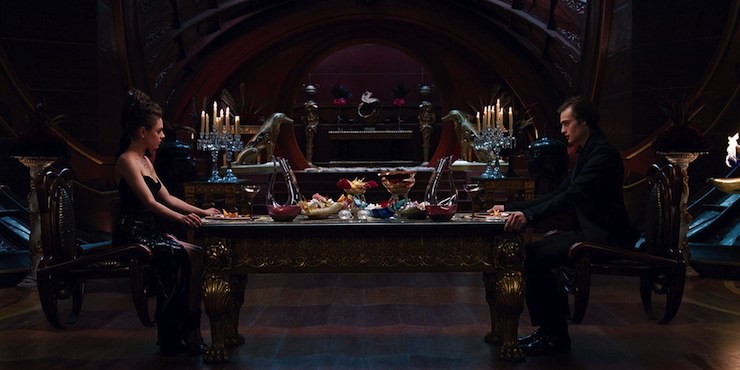
Jupiter Ascending is not that movie.
The film has an intricate backlog of intrigue and politics that the audience is only getting base level access to. There is an entire universe of commerce and class systems that we have no context for, and while the shorthand is interesting, it opens up far too many questions to satisfy. Human being can be spliced with animals? Any kind of animal? How many animals? Are they all ones that we’d know? What about the people spliced with cyborgs? Where do they fit in class-wise, and were they always cyborg-y? Are they actually androids with no real human parts? How did the turn-people-to-serum-for-youth business start and/or get discovered in the first place? The Abrasax family appears to have power, but not to be directly in charge, so what kind of government body is? Are there citizens of this universe who take exception to human splicing with animals genes for the purpose of labor and military use? Where are they?
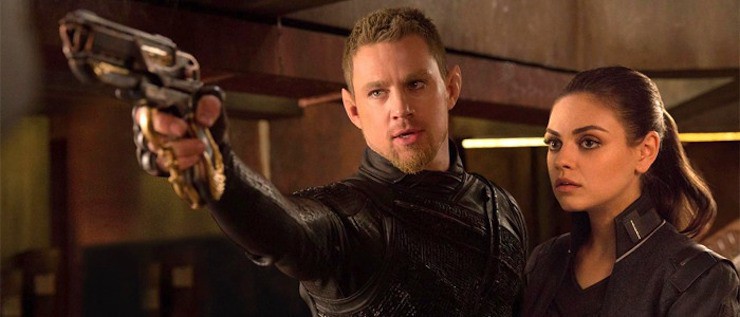
These are only a small fraction of the questions I had the first time I watched. And to be fair, the fact that the film prompted so any questions still means that the Wachowskis developed a wonderfully complex world that I’d be happy to spend more time in–and many fans of the film clearly felt the same. It’s just a shame that it rendered the film too muddy to prompt more advocates to its cause.
Of course, some of the questions I had were less flattering to the premise, like, what the heck happens to Stinger’s daughter after he rockets away, and who the heck is Jupiter’s buddy Katharine Dunlevy exactly and did they literally become friends because Jupiter cleans her house because that seems relevant, also, why does looking identical to the Abrasax matriarch make Jupiter owner of the Earth, but not anything else the woman had control over before her death? These are things that it would be extremely helpful to know.

The two main inspirations for the story were the Odyssey and The Wizard of Oz, with Odyssey being more of the spiritual predecessor and Oz being the practical one; the Wachowskis liked the idea of bringing the typical portal fantasy heroine, like Alice or Dorothy Gale, into a space opera setting. (Yes, that does mean that Caine was patterned after Toto. No, I’m not kidding–the Wachowskis said so. Let that one settle in your brain for a minute.) The idea was to flip the trope of the “stock space hero” who is stoic and tough with a woman who negotiates her way through trouble with empathy and smarts. To be fair, Jupiter doesn’t always manage this–her near-marriage to Titus Abrasax Smarmy McShirtless Artful-Poutface, Lord of Orgy Grove, is by far her dimmest move in the narrative, especially seeing as there is no way to look at Titus without every single creep meter going off in your brain, unless you actually think guys like, oh, Dorian Gray are just misunderstood woobies in need of a helping hand. (Seriously, has Douglas Booth ever played Gray? He should.)
But while moves like that don’t really work in a narrative sense, they do work to make Jupiter a more endearing hero. The tale sets her up as a perpetual doormat in a manner that is deeply distressing–to the point where she is willing to sell her eggs to make cash (to buy a telescope like the one that belonged to her dead father), but give her cousin two-thirds of the money… presumably because the whole thing was his idea? He makes some comment about capitalism when she asks why he should get such a large cut, but it doesn’t really play, so we have to assume that Jupiter is just letting him walk all over her because that’s how she is. Throughout the story, Jupiter gains more and more determination and will to fight back–a consequence of her choices now determining the future of humanity rather than just her own. It provides more motivation for her transformation into a heroic figure than your average origin story, and is more interesting for how Jupiter tries (and sometimes fails) to navigate the impossibility of the situation. It makes her story feel more real.
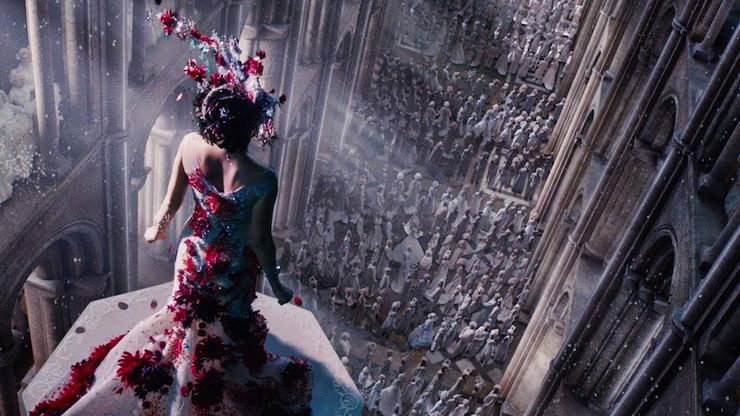
There is an element of wish fulfillment to the film that many female critics latched onto–a hero’s story, but with specific touches that make it clear who the target audience is meant to be. Jupiter lives a life that seems inconsequential to her, then has a universe of possibilities open up in front of her. Her journey requires an acceptance of nobility, changing in and out of incredible outfits, proposals of marriage, harrowing chase sequences, and a hunky guy who attaches himself to her side from the moment they lock eyes. It’s better than a princess narrative because it’s not about being whisked away to a castle, never to toil or worry again–in fact, the narrative is basically the opposite of that in every way–and hits beats for its female audience that are often looked down upon by action films. And because Jupiter has her beginnings as a character who is accustomed to getting steamrollered, she retains a certain level of awkwardness that your average viewer can empathize with; when Caine tells her that he basically has more in common with a dog than a human, and Jupiter blurts out “I love dogs, I’ve always loved dogs,” it’s impossible not to wince and laugh at the same time. Even she knows it was a ridiculous thing to say.
I read reviews of the film before I saw it the first time, and wondered whether this approach was going to work for me, only to have it confirmed by the character of Caine Wise. Suffice it to say, Channing Tatum is really not my usual type when it comes to men. Yet in this film? He totally works for me. Cannot explain it. (They said that he had to wear some kind mouthpiece to give his jaw a more canine-type shape? Maybe that’s part of it? Apparently it was really irritating for the poor guy to wear.) It might be the near-werewolf thing they’ve got going on? Then again, it might just be how successfully he broods and growls and stalks around through the whole ordeal, only to make sad, sad puppy eyes every time he looks at Jupiter. It just does the job.
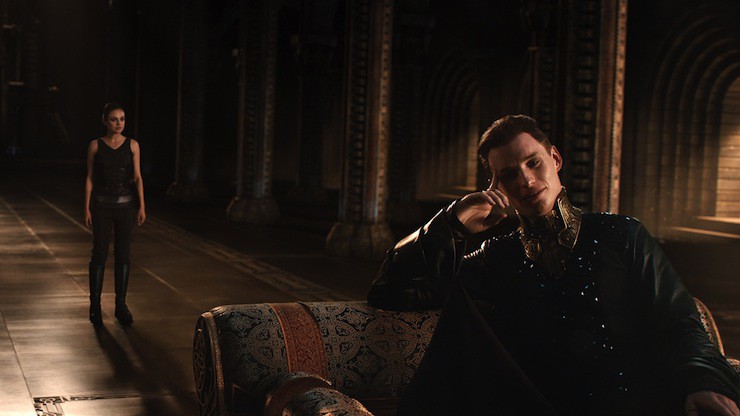
Also, can all villains be Balem Abraxas? Eddie Redmayne won a Golden Raspberry Award for Worst Actor in a Supporting Role for this part, and I can only guess that it’s because people don’t understand true mastery when they see it. Eddie Redmayne won an Oscar for playing Stephen Hawking the very same year, which is great, I guess, but Hawking is a real life person, someone that Redmayne had the ability to research and study and engage with. (I have specific opinions on actors usually getting awards for playing real people in biopics anyhow, but that’s a discussion for another time.) Balem Abraxas came out of his brain, everyone. No one told him he had to do what he did–though I presume that he worked with the Wachowskis on building the character to a certain degree–he just did it. Of course the character is over the top, because how could a character like Balem Abraxas not be an aggrandizing mess muppet? If we had gotten a performance any less overwrought than this, I promise you that the entire movie would have fallen apart.
There is an attention to the female body and female roles in this film that cannot be understated, and I can’t help but wonder if this awareness or focus comes as a result of the Wachowskis’s transitions. Jupiter agrees to sell her eggs in a deal where her cousin gets the primary benefits and undergoes none of the risks. He continually tells her that this operation is no big deal, though he isn’t the one who has to go through it–and ends up spending his share on a video game system and large television. In that respect, the film does an excellent job of showing the ways in which women’s bodies are used and commodified without resorting to a rape or sex work narrative (a tack that is obviously far more common). Cousin Vladie has no way of making this money on his own, or would simply rather not do that work in the first place–as cousin Moltka later bemoans, he has treated his cousin “like chicken.” Like an asset and object rather than a person.
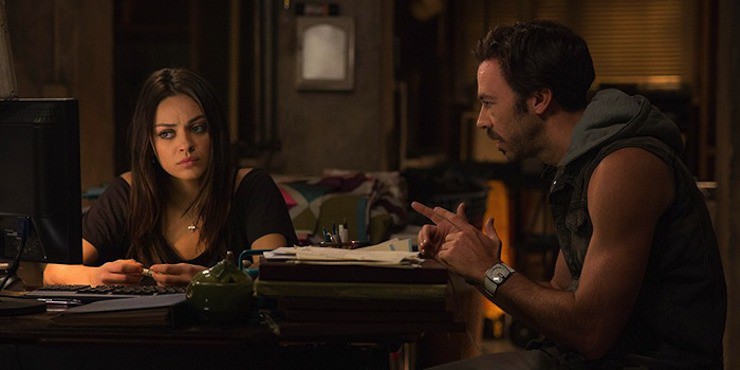
There are other cues as well–for example, when Jupiter finds that Caine has been injured in their escape from Balem Abrasax’s agents, she ends up trying to staunch the blood with a maxi-pad. (Though she seems to do this by pressing down on the wound with the adhesive side, a goof that is patently hilarious to witness.) Caine shows brief discomfort over the idea, but Jupiter insists, refusing to let an acknowledgement of the fact that women menstruate get in the way of administering first aid.
And of course, there is the oddness of Jupiter looking exactly like the deceased Abrasax matriarch, then encountering all three of the woman’s children, who proceed to handle her with various levels of attraction and disdain. Kalique is the first, who tries to tempt Jupiter with the allure of everlasting life through their serum, in a show that is decidedly sensual in nature. Titus offers to help Jupiter through marriage, though the kind that he pegs as more of a business transaction, and is later revealed to be a liar. But though the first Abrasax siblings show little care for boundaries when faced with someone who looks just like the woman who raised them, it is the Jupiter’s encounter with Balem that strikes the most disturbing note. She divines that Balem was the one to kill his mother, and though he continually insists that he knows the different, it is clear that Balem is projecting his mother onto Jupiter. The final fight turns personal, with Jupiter trying to protect her own family as Balem comes after her, and in the end, she dispatches him with the words “I am not your mother.” In effect, she rejects the maternal mantle that Balem desperately wants to place on her; though he is revealed to have killed his mother, he says at the beginning of the film that he misses her because she was the only person who “truly understood” him.
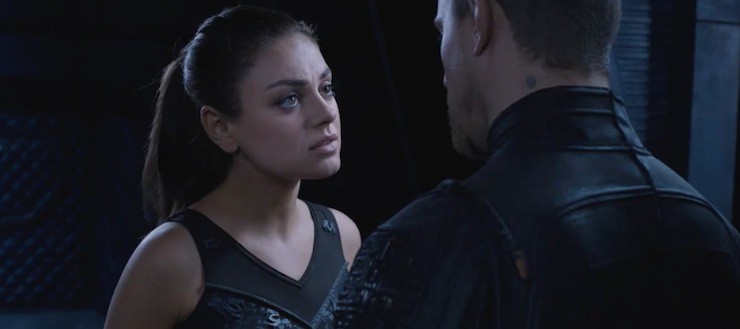
This is more fascinating for the fact that Jupiter, as a female protagonist, is allowed to be and feel explicitly sexual without being maligned for it. Her attraction toward Caine is romantic and sexual in nature, and that desire is addressed and played up for the benefit of the viewer, without making her out to be overly promiscuous or “bad.” Addressing female desire within a narrative is something that Hollywood films often still struggle with–they’ve come to realize that woman will sit in the audience to watch an attractive man, but they often won’t allow a woman on screen to show that same desire candidly if she’s meant to be a hero. Desire and sexuality is still mostly the purview of “evil” women in fiction.
One point in the story where many fans have cited a play on trans issues comes when Jupiter arrives on Ores, the capital planet, in order to claim her inheritance as owner of Earth. While it can be read as an indictment of government bureaucracy, it seems more to be a particularly sharp commentary on the difficulty that trans people often have in changing their IDs and paperwork to reflect their chosen name. (After all, Jupiter is obtaining “a title.”) Pointedly, it might be the funniest section in the entire film. Jupiter is assigned a helper named “Intergalactic Advocate Bob,” and proceeds to pass through countless different offices, fills out a myriad of confusing forms, and gets told time and again that she doesn’t have the information needed to continue. The whole thing is eventually revealed to be a giant catch-22 that can only be solved with the application of bribery, and then, finally, they arrive at an office run by Terry Gilliam. Gilliam, as Seal and Signet Minister, proceeds to homage his own film Brazil in a brilliant little scene that finally ends with Jupiter receiving her title, and says “Well, congratulations, your Majesty. And my deepest condolences.” As a commentary on the real life struggles of trans people, it doesn’t get more entertainingly on the nose than that.
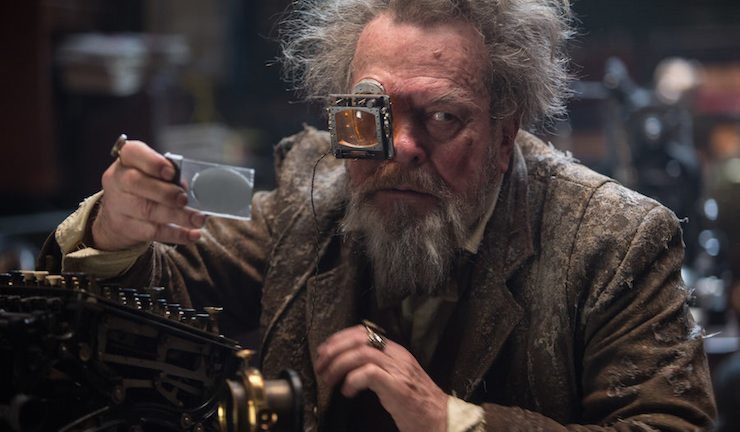
But the thing that really makes this film work for me is the use of “time economy.” (It’s another indictment of capitalism, really, much like Speed Racer was.) The story reveals to us that the only true currency in the universe is time. People will murder countless beings on faraway planets and drink whatever’s left over of them in order to gain more time in the universe. It’s a common trope in science fiction that often zeroes in on the aspect of beauty–people want everlasting life because they want the ability to stay hot forever. But while that idea is briefly entertained in Jupiter Ascending, this economy has far more to do with the ability to stick around indefinitely, to have freedom to do as one pleases always and infinite days to enjoy that freedom. The first time I watched the film, that idea hit hard–because while this has always been true after a fashion, we are heading further down that road now in ways that we barely quantify on a day-to-day basis.
I’m not talking about plastic surgery or the potential to cryogenically freeze our heads until we can survive in the future. I am talking about the ways in which we are constantly paying out to free up more of our time: Should I put up these shelves myself and learn a new skill, or should I pay someone to do it for me? More often than not, it’s all about whether or not you have the time.
Do I have the ability to pick up that birthday gift today, or should I pay through an app to have someone grab it for me so I can get all my other errands done? Time.
Trek though the shopping mall for hours, or have that thing delivered in two days via Amazon Prime? Time.
Think up my own ideas for meals and plan out what food I have to buy, or let a service pick out the exact items I need, and deliver it in a kit complete with recipe. Time. It’s all time. People who have more wealth can afford to spend less time on draining activities, and more on what they love because we live in a world where, more than ever before, money buys you time.
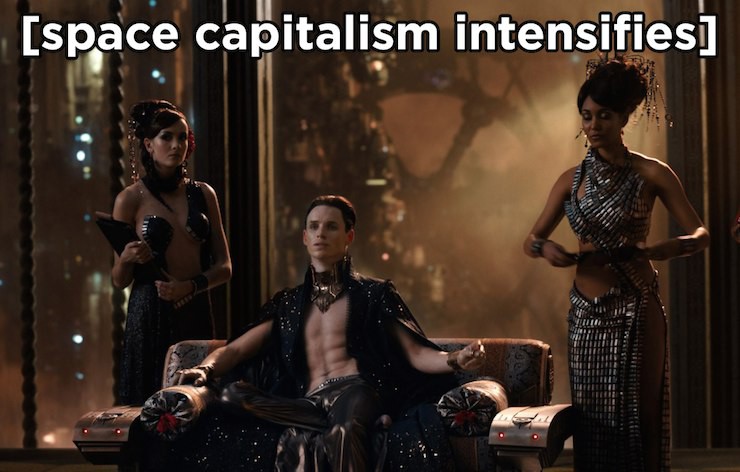
The fact that this is at the heart of Jupiter Ascending speaks to everything that the Wachowskis do brilliantly. This movie is silly and strange and incredibly shot and oddly innovative, and the core of the narrative revolves around something very real and very frightening that we all need to pay more attention to in the future.
And then it ends with the owner of the Earth (happily returned to her family and newly pleased with her lot in life, after having a frightening wealth of responsibility dumped into her lap) hanging out with her humanoid boyfriend on hover blades, on the very best date ever. Because whatever our future holds, the connections built on love and trust are the only ones that will keep us afloat. This theme every single time, in every single tale the tell. Because however dark their stories get, the Wachowskis clearly have hope, and they hold that above all. Against the backdrop that is the constant destruction wrecked by blockbuster films, that is perhaps the most gratifying thing to see.
[space capitalism intensifies] pic via the Jupiter Ascending Appreciation Tumblr
Emmet Asher-Perrin plans to speak like Balem Abrasax for the rest of the day, and no one can stop her. You can bug her on Twitter and Tumblr, and read more of her work here and elsewhere.










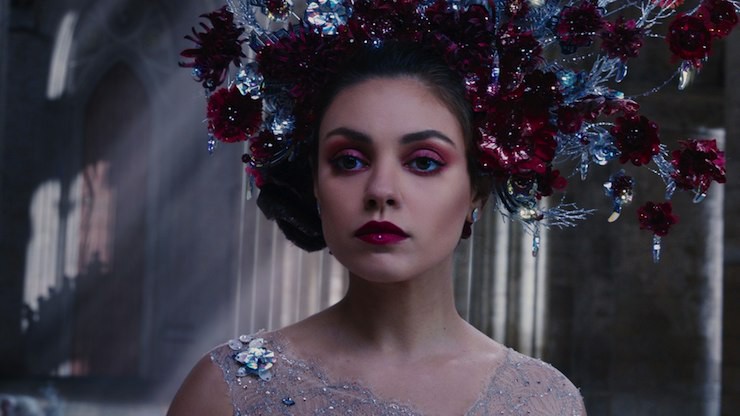
“Why does looking identical to the Abrasax matriarch make Jupiter owner of the Earth, but not anything else the woman had control over before her death?”
Didn’t the film state that it was in the matriarch’s Will? Her property was split up among her children, but should she be reincarnated (Jupiter doesn’t just look like her; she’s a genetic duplicate), her reincarnation will get Earth.
I’m one of those people for whom this film is the Holy Grail of almost everything that I want in an adventure, and so many of those things in abundance. It’s certainly got its problems, especially as far as story and focus, but I’d line up to see more films like JA before most of what else is out there, every time. Very sad to me that such an incredible production is ultimately just a one-off (see also the much objectively-better John Carter).
My one particular criticism would be that Mila Kunis perhaps wasn’t the best choice of lead, here. On one hand, she really fits the idea of Jupiter Jones, but on the other, once we jump into grandiose space opera territory, she gets kind of lost in the mix, for me. Meanwhile, Gugu Mbatha-Raw and several others just sparkle with charisma in smaller supporting parts.
I like this movie way more than it probably deserves. I agree it kind of plays like a highlight reel from a larger story; I wonder how much more was in the script originally?
I’ve showed it to a couple of friends, both of whom kind of laughed hysterically, but enjoyed it nonetheless.
I love this movie, but the “highlight reel” thing is spot on. I’ve said more than once that I want to read the ten graphic novels this movie was adapted from, because the story is exactly the sort of mess that happens when an ardent fan tries to condense everything into an adaptation, instead of picking and choosing. Except, you know, for the part where those graphic novels don’t exist. (Though oh how I wish they did…)
Oh, come on. Jupiter Ascending was a jumbled, ill-conceived, poorly written mess of silly, pseudo-philosophical gobbledygook and uneven CGI action nonsense. Channing Tatum looked ridiculous, Sean Bean looked catatonic, Mila Kunis proved that she can’t carry a movie and Eddie Redmayne’s performance consisted entirely of mumbling, screaming, mumbling again, and then screaming again.
Thank you for this excellent exploration of Jupiter Ascending’s narrative and the Wachowskis’ unique perspectives. I was shocked at the negative press when it came out and I raised some questions why that might be in my response to the film
Considering how much you liked Speed Racer and continued to insist that the “bad guy” was capitalism, it’s no shocker you liked this one as well.
Money does buy time, yes, but I think some of your examples are rather poor. Buying stuff from Amazon isn’t just about time — it’s also about avoiding the slog through the store, fighting the crowds, and then possibly not even finding the item you’re looking for. Also, you don’t have to be “rich” to afford Amazon.
Paying someone to install shelves (or I’m going to assume you meant handyman type stuff, because I seriously don’t know anyone who has ever paid for shelf installation that wasn’t something massive/builtin), isn’t always about “learning a new skill”. Sometime stuff is just dangerous, or best left to the professionals. Or maybe just plain not interesting for some folks.
I’m also not really sure what the point of that section was. Are you saying trying to save time is just a slippery slope to full blown EVIL, making you willing to eat/kill people to increase your life span? Because that’s kind of what it sounds like, and I hope putting it in those terms sounds as ridiculous to you as it does to me.
The entire history of man is nothing but attempts by man to make life easier (and thus save time for more leisurely pursuits). And you can argue till your face is blue as to whether we have succeeded or not, but it’s not EVIL to want a better life, nor is it EVIL to earn and spend money to get that better life.
It’s only EVIL when you start doing it by killing others to eat their souls for immortal life. Because obviously Space Whale Aesops are srs bsns.
I haven’t seen the film, but I just checked using the Direct TV menu and it is available, so I’ll download it and watch the movie keeping in mind what you said.
I was looking forward to the film but with so many negative reviews I didn’t bother to see it in the theatre. Will see how I like it.
I haven’t seen this movie, although the clips I have seen tended to make me agree with those who said it was terrible, which was a bummer because when I saw the preview for it I was really hoping it would be good.
That said, I do appreciate hearing from someone who actually likes this movie and can explain in a very sensible and understandable way exactly why she likes it. It kind of gives me a new perspective to consider, as up until now I’ve only heard from those in the OTHER camp.
Nice review, but the part in which the author interprets Jupiter’s adventures in galactic bureaucracy as some form of trans statement feels far-fetched. Just because the Wachowskis lean towards socialism, can’t they poke fun at the shortcomings of their own ideology? Just because they’re trans, must they always feel like making a statement about it? Sometimes, Occam’s Razor applies and things are simpler than they seem to be.
I thought I was the only one who enjoyed this film. Besides being visually spectacular and full of really fun stunts and effects, the underlying themes (our constant hunger for MORE, the ridiculous value we place on all the wrong things, the true preciousness of the time we’re given, and how we waste that priceless resource, etc.) are well worth exploring. One thing I love about The Wachowskis is that they’re committed to the idea that really big questions about the human condition do NOT have to take the form of an Ingmar Bergman movie – they can exist in films that are fun and exciting and sexy.
Someone described Jupiter Ascending as (from memory) an utterly ludicrous batshit insane movie that happened to be marvelously entertaining movie. That about sums it up for me. I really wish it got more respect.
It’s like a wonderfully deranged anything-goes space opera RPG setting come to life.
I liked my initial viewing of the movie so much that I’m reluctant to see it again, if that makes sense. If I see the Blu-Ray for cheap, I’ll probably buy it.
P.S. An earthquake preparedness lecturer suggested stocking some sanitary pads in the first aid kit, as pressure dressings. Even I would know not to use the sticky side! But I guess the tape-it-on thing is visually funnier.
I enjoyed the first two thirds or so of the movie but I was very angry at the way the story ended. I can understand why some people would love the movie, but I feel like the motivations of the children, the way the story disposed of its villains and pretty much everything involving the premise of an advanced futuristic society that somehow manages to go backwards in terms of government and the way it treats its members just ticked me off. Not only that, but I just could not buy into the idea that someone who was functionally immortal barring accident would be so cavalier about safety and that the tech itself would basically self destruct for no reason other than the fact that the plot demanded it.
Pros: Female/trans/werewolf empowerment message +5, Cool visuals +3.
Cons: Super advanced tech with no possible way that it could have developed using the given system of government, or any explanation as to why the hell they’ve got some feudalistic nightmare system ineptly running things -100. Use of technology to self-destruct the antagonists for plot reasons, when functional immortality means they should be extremely safety conscious: -100.
Overall, if I had stopped the film with about an hour to go and skipped to the end, I may have been okay with it.
Someone has to say it. That final image macro makes it look like Eddie Redmayne has gigantic penis wrapped in a silver condom.
—
Dicks aside, it’s very obviously a critique capitalism, but not a very compelling one. This is a common problem, I find, when trying to convey contemporary social/political issues through speculative media. The writer attempts to provoke a comparison, but the comparison is too fantastical and out there. Sympathetic readers nod along and say “of course”, but it utterly falls flat if you miss it or reject the initial premise.
(I’ve had this argument more than a few times about the Hunger Games).
I really loved this movie! Thanks for pointing out some of the great things about it. Yeah, it had its flaws, but iirc, it was the only original (major) film in a year of reboots and sequels. It felt like a breath of fresh air.
RE: the glimpse of the expanded universe that you mentioned, I came out of the movie expecting that it had been based on a book, since it seemed like there was a lot more going on. I eagerly went online to find the book and was disappointed :(
Visually it was beautiful. Yeah, the story was a little confusing at times, but I still was incredibly entertained and I thought it was a great movie for the $. I can’t say that about many movies I’ve seen lately.
Also, I thought Eddie Redmayne was fantastic. He is an amazing actor in general, I think the portrayal just wasn’t taken for more than surface factors by most people.
Anyway, thanks for your review! Really enjoyed it!
I absolutely love this movie! :) Yes, it’s crazy and has plot holes up the wazoo, but I adore it anyway and this review sums up many of the reasons why.
I love the worldbuilding, the characters, the costumes, the quotes, her journey, and yeah, Channing Tatum usually doesn’t work for me, but for some reason this works anyway. :)
Thanks for your review! I saw JA back to back with Kingsmen, and finished wondering which I enjoyed more. Like another reviewer, I left the theater with intentions to read the book, or whatever source material there was, for the rest of the story, and was so disappointed to find out it was a “one and done.” All in all, I thoroughly enjoyed the movie and would be delighted if the siblings made another installment.
Why are even talking about this movie….yes the story might have been engaging if the casting, acting and dialogue, and plotting of this movie had not been executed so poorly.
nuff said..
Oh fab article – thanks so much. I really, really enjoyed this film. And I think Stefan Jones’ previous comment really sums it up for me too – “Someone described Jupiter Ascending as (from memory) an utterly ludicrous batshit insane movie that happened to be marvelously entertaining movie.”
Hadn’t thought of the idea of a trilogy but how bloody awesome would that have been! The richness in this world, however insane, is incredible. I want to see more.
Nice to see someone else enjoyed it. Wasn’t too much of a fan of Kunis in it but it had a lot of neat stuff.
Going through it I looked back through my notes and checked up with a few other breakdowns.
The reason why Jupiter was given rights as the owner of the corporation was due to her being an exact genetic copy of their mother. Apparently one of the rules of this universe was that if someone shares their DNA they tend to have a fair case to claim rights. Especially if the person they shared it with is dead.
It seems to be derived from the sheer improbability of it happening. Although it does happen enough to have a protocol.
Either way some of the stuff leaves it as something people might end up looking up years from now. Maybe as a cult hit.
I enjoyed watching this movie for the visual spectacle, not so much the story. Kind of like the Star Wars prequels. My biggest problems are with the ending:
1. No way am I living with my abusively selfish family and cleaning toilets when I could be out exploring the galaxy. I don’t care what kind of self-flagellation complex I have.
2. I decide to take ownership of the Earth to prevent it from being “harvested” for youth serum. But I won’t take the youth serum, so in 60 or so years I die and the ownership of the Earth passes to someone else. Eventually it goes to someone less scrupulous and the Earth gets harvested. The easiest way to keep this from happening is to use the serum. This is unacceptable to me, so instead of spending my time cleaning toilets I use my new wealth and potential political influence to make the youth serum illegal, and/or to fund research into nonlethal ways to harvest it or produce it synthetically. I use the serum only as long as it takes for this to happen.
On the plus side, I clearly identify with Jupiter in some way, since I’m using the first person here. I’m guessing that she would eventually come to this realization herself, and leave the toilet cleaning behind. Unless she’s just stupid.
This film was a goddess-journey, which is probably why so many people felt like it was “off” – we’re used to the hero’s journey and not the journey of the goddess through the underworld (I blogged about that in more detail at my blog). I loved it because of its flaws. It was visually stunning, and it defied the usual tropes in that way that only someone who knows them inside, outside, and backwards can defy them. I strongly suspect that every choice the Wachowskis (and possibly most of the actors, too) made was deliberate–I have no doubt that Eddie Redmayne and Sean Bean both have the chops for taking their roles and subverting audience expectations. And Jeez–Eddie Redmayne is *brilliant* in this. Mila Kunis and Channing Tatum were perfect choices. Tatum doesn’t usually do it for me, but the guy’s smarter than he looks, and Mila Kunis, although I had a hard time not seeing Meg Griffin when she spoke for the first fifteen minutes of the movie, is perfect for the role–she’s not *supposed* to have superstar presence.
Honestly, I think this would have made an epic killer sci-fi series. I would have binge-watched and bought every episode. There’s a part of me that thinks JA was what made the Wachowskis realize they needed more space than a single movie to tell their stories, so without Jupiter Ascending, we might not have had Sense8.
Wow. I’ve not watched the movie, nor I planned to, but after reading your analysis I’m totally intrigued. Thanks for your great sharing.
I’ve seen this 3-4 times now (including in the theater) and I loved it. It is completely and absolutely ridiculous and over the top (go back and re-watch the various scenes of ships docking with other ships). The visuals were amazing.
I liked that it played with existing secret princess tropes and then subverted them. Like some of the other commenters, I expected that this was based on a comic book series (because isn’t everything these days?) due to the amount of world-building that did get packed into the movie.
A couple of people ask why Jupiter inherits what she inherits, the answer is that this society (or at least the nobles in this society) believe that genetic duplicates are basically the re-incarnation of their predecessor.
It’s a little bit like what might happen if you disappeared, were declared dead, and your will was carried out, and then you showed up alive. Awkward.
So in this society folks with large amounts of property (the nobles) carve out a contingency for if they are re-incarnated. Which if you believe the genetic duplicate thing (which is silly) is actually a pretty smart thing to do.
That contingency in Jupiter’s case includes (but is not necessarily limited to) the Earth. Maybe think of it as venture capital for your re-incarnation to successfully bootstrap themselves back into relevance.
@21
My girlfriend and I watched this and had similar questions about why Jupiter is still cleaning toilets. My personal take on it is that after dealing with everything, cleaning toilets is relatively relaxing and non-stressful and she needs some time to adjust.
She’s young, with galactic quality medicine (excluding human juice) she might live to 100 or so. So there is time to try to set up some kind of unbreakable trust for the Earth, start an anti-harvest campaign, etc. Trying to overthrow an entire system of economics is a big ask for a early/mid-20’s immigrant whose career has been limited to housecleaning up to now.
There may be some allies out there for her on the anti-murder-for-youth front. It’s clear that the galactic society is NOT monolithic. The police force seemed pretty chummy with her and more diverse (and possibly less prejudiced) than the limited view that we have of the nobility. So perhaps the Abrasax family is a powerful but aberrant example of the nobility. Perhaps not.
One of the reasons that my girlfriend and I liked this movie so much is that there are a huge number of questions that are raised by what is revealed in the film itself. I would love to have had this as a TV series.
Did anyone ever stop to think what if some of this story is true? Think about it earth is a field of humans, we’re here to be harvested?, i know that sounds crazy, but at the same time its terrifying. What if its true?
Anyways besides that thought I did like the movie very much